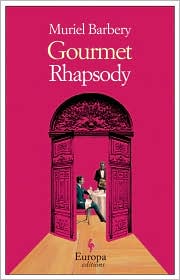“I am going to die and there is a flavor that has been teasing my taste buds and my heart and I simply cannot recall it. I know that this particular flavor is the first and ultimate truth of my entire life, and that it holds the key to a heart that I have silenced.”
Pier re Arthens, a French food critic who regards himself as “the greatest food critic in the world,” has just discovered that he is dying, with only forty-eight hours to live. A resident of the Rue de Grenelle apartment building which is the center of Barbery’s The Elegance of the Hedgehog, Arthens looks back on his life, trying, in his last hours, to remember the most special flavor of his lifetime, an effort to give his life meaning. As a critic, he has made and destroyed reputations with his pronouncements, but now, on his deathbed, he is vulnerable, forced against his will to confront what he has regarded as his life and to understand where he really fits into life’s grand scheme.
re Arthens, a French food critic who regards himself as “the greatest food critic in the world,” has just discovered that he is dying, with only forty-eight hours to live. A resident of the Rue de Grenelle apartment building which is the center of Barbery’s The Elegance of the Hedgehog, Arthens looks back on his life, trying, in his last hours, to remember the most special flavor of his lifetime, an effort to give his life meaning. As a critic, he has made and destroyed reputations with his pronouncements, but now, on his deathbed, he is vulnerable, forced against his will to confront what he has regarded as his life and to understand where he really fits into life’s grand scheme.
As a protagonist, Pierre is less than sympathetic. His children refuse to come to his deathbed, not surprisingly since he does not love them, has never loved them, and feels no remorse on their account. “The only paternity that I might lay claim to is that of my own oeuvre,” he has decided, believing that children are just “monstrous excrescences of our own selves.” His son Jean has concluded that “I have never been anything other than the son of a monster.” His daughter Laura regards him as a “brutal man,” smug, never relaxed, and, more importantly, never at home. Another son, Clemence, remains outside the narrative, regarded, like his siblings, as an imbecile. As son Jean observes, “You could have made them gods, your kids…My sorry life has been spent longing ardently for all the love you have withheld,” Arthens’ wife Anna, a trophy wife, has known from the outset of their long marriage that she is not a priority, but she also knows that he will always return home to her, not to any his many mistresses, and that is enough for her.

Alternating Pierre’s comments about his life with comments by family members and others who have strong feeling about Arthens and his attitudes, author Muriel Barbery recreates in lush and elaborate prose the life of this difficult and unlikable man. His family background; his youthful vacations in Tangiers, the home of his mother; his vacations with his wife and children in Brittany and Timos, Greece; his discovery of the incredible taste of fresh tomatoes, while sitting under a linden tree at the home of his coarse Aunt Marthe, a “piece of human scum casting her rotten foul stench onto everything around her”; his experience of a perfect meal of shrimp with rice, prepared by his uncle Jacques Destrieres; a meal of oysters, smoked ham, bread and butter and apple tart in the countryside of France; and his discovery of Scotch whisky at the age of fifteen while visiting his grandfather’s friend, all contribute to the fond memories Arthens has of the gastronomic experiences which have informed his personal and professional life. No one is sad that he is dying.
A novella, rather than a novel, this often charming look at the life of an impossible man who waxes ecstatic about food, its preparation, and its presentation. Resembling a fruitcake overfilled with sweetmeats, rather than a traditional narrative, the novel might be described, in Arthens terms, as consisting of “succulent” language enhanced by “intoxicating” and “effulgent” imagery, which is marinated in “astringent,” “full-bodied” cynicism. By the time Arthens identifies the perfect flavor that he has been trying to remember, the reader feels as if s/he has partaken of a ten-course meal, the dessert to which is somewhat anti-climactic. The book is uneven and self-conscious, but its wry depiction of the overweening self-importance of food critics and their purple prose makes it fun to read–a fascinating and stylish introduction to some of the ideas which Barbery, six years later, will bring to more controlled fruition in The Elegance of the Hedgehog.
Notes: The author’s photo appears on http://www.washingtonpost.com
